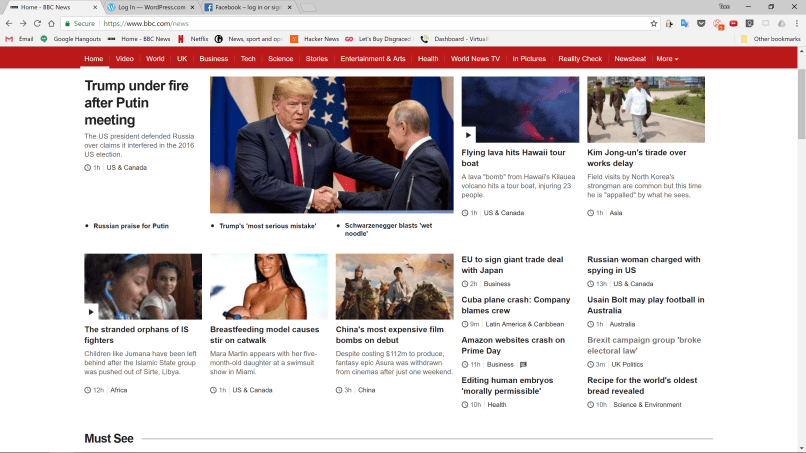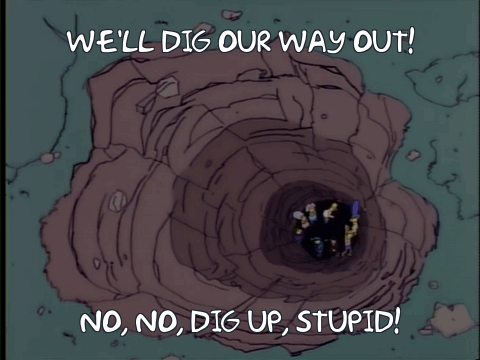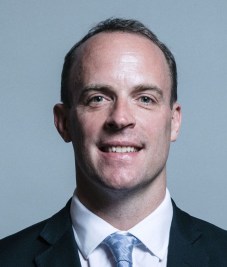Yesterday I wrote a piece on Nick Robinson’s worrying approach to political interviewing. In a tweet, the experienced former BBC and ITV political editor and current Today presenter argued:
I found this quite surprising, and sought to explain why. However, I’ve noticed that there are several other examples popping up of similar disputes on BBC journalism and its role in the UK’s political discourse.
Much of the criticism of the BBC’s coverage has focused on its attempts to find ‘balance’ over the vital issue of the UK’s potential exit from the European Union. It’s important to recognise that some of this criticism definitely veers into tinfoil-hat conspiracy theorist territory. There are people who appear to genuinely believe that the BBC is colluding with Russian bots, voracious hedge funds and shadowy Tory donors to force the UK to toe the Vote Leave line.
I imagine that if I were a BBC figure of any serious standing, I would feel pretty strongly about such nonsense. I have been extremely reticent to criticise the BBC because of this trend, and also because they have regularly been under extreme pressure from powerful Conservatives who are dying to kill Auntie, leaving even more space for the right-wing partisan media.
I have no doubt that the vast majority of BBC journalists and reporters are honestly trying to do the kind of work we expect of them: doggedly reporting the truth in the public interest, uncovering wrongdoing and corruption, and holding power to account.
However, that doesn’t mean they’re doing it right, nor does it mean they’re exempt from criticism. Nor does it mean they’re free to mischaracterise the legitimate criticism they do receive. One example of this comes from Rob Burley. He’s the editor of several BBC live political programmes, including the Andrew Marr show and the Daily and Sunday politics. Perhaps to his credit, Mr Burley engages frequently with people on Twitter to debate whether his shows have presented things fairly and well.
However, yesterday he defended this tweet, published by one of his shows:
The full clip shows Suzanne Evans, a UKIP spokesperson, repeating several lies about the recent Electoral Commission report on Vote Leave, the official campaign for leaving the European Union. One of the key lies is the entire text of the tweet: that the Electoral Commission ‘refused to interview Matthew Elliott and Dominic Cummings’. Elliott was the Chief Executive of Vote Leave, while Cummings was Campaign Director.
The reality, made abundantly clear in the Electoral Commission’s report, is that Vote Leave took obstructive action to avoid participating in the investigation, failing even to acknowledge deadlines, let alone comply with them. The findings from 4.70 onwards (page 29) indicate that the EC had to deal with intransigence and stubbornness from Vote Leave that also reflects their subsequent attempts to spin their way out of their decision to break the law during the referendum campaign.
The BBC allowed itself to be used as part of this spin campaign. It allowed Vote Leave to leak the fact that it was about to be found guilty, giving Matthew Elliott the chance to put out his lines before the official report was made public. That in itself was astonishingly irresponsible.
On the day the report finally came out, I was in Sweden. However, the BBC being the UK public broadcaster, I was eagerly expecting to see a major story appear on the main news website. Imagine my dismay when I saw that the story had been relegated to an effective footnote, appearing between a story about Usain Bolt playing football, and a recipe about the world’s oldest bread:

Screenshot of the BBC News front page, taken on 17th July at 11:07am
Burley spent a lot of his time yesterday defending the tweet about Suzanne Evans. In doing so, he showed that Nick Robinson’s view of journalism and interviews is not confined to one senior man at the BBC. Here’s him for example, suggesting how the ‘free media’ works:
This is the kind of ‘balance’ the BBC now offers: for a ‘version of events’ that is ‘disputed’, read ‘a factually incorrect account of an investigation done by the statutory regulator of elections’. For Burley, it is enough that Evans was ‘challenged directly’ with the opposite view.
In conversation with Adam Bienkov, another political journalist who works at Business Insider, Burley doubled down:
The fact that opposing sides say different things about something is not surprising. As Bienkov suggested, we would be shocked if there were many legal cases in which the guilty party did not maintain their innocence even after the verdict was passed down.
Burley’s defence is that the clip is about ‘the interviews thing and not the verdict‘, but he fails to recognise that the EC report addresses the issue of interactions between them and Vote Leave in a very substantial way. In fact, it hands down a verdict about precisely this issue: that Vote Leave committed an offence under Schedule 19B paragraph 13(1) of the Political Parties, Elections and Referendums Act.
In other words, on the specific matter of interviews, with which the clip deals, Vote Leave aren’t just lying: they have been found guilty of breaking the law.
Burley finally followed up with this shrug of a tweet, posted about half an hour later:
This is an argument that speaks of understandable frustration. As I said earlier, I have no doubt it is true of some people. However, Burley doesn’t get to act all dismissive when it comes to legitimate and accurate criticism of the shows he runs, including their social media output.
This was echoed by Daniel Gibson, a former BBC journalist, in a lengthy thread that he subsequently muted. Click the link at the bottom of the tweet to read it all.
Gibson’s thread is passionate, well articulated, polite, and wrong. I have already explained why the specific example of the EC/Vote Leave issue was incorrect, and why the defence of it is ill-founded. However, Gibson compounds the errors by making some truly remarkable assertions:
I addressed this in my post yesterday, but just to reiterate: in an age of ‘fake news’, this is a horrifying claim. You cannot assume that the information given in political interviews is accurate or truthful. It doesn’t mean that you have to treat every interview as an interrogation – I am not advocating Jeremy Paxman’s approach (“Why is this lying bastard lying to me?”). It does mean that you have to outprepare your interviewee, and know the facts better than they do, so that you can correct the record immediately.
Another astounding statement followed:
This is the famous myth of impartiality, which the BBC still appears to subscribe to. Unfortunately, it is broken. I had thought we had all understood and recognised in the 21st century that there is no such thing as neutral/unbiased reporting; in fact, attempting to appear unbiased at all costs is likely to cost both you and your audience dearly.
The reality is that we need journalists who are prepared to give us true information, and ensure we understand when the opinions we hear have no factual basis. Perhaps then we can get back to the kind of political discourse that doesn’t lead to the country embarking on an undeliverable fantasy, after a referendum whose winner has been shown to have cheated.
If journalists and editors want to defend the BBC in public, they’ll have to do a lot better. They should avoid the Simpsons’ approach and instead take Denis Healey’s famous advice: “When you’re in a hole, stop digging.”








